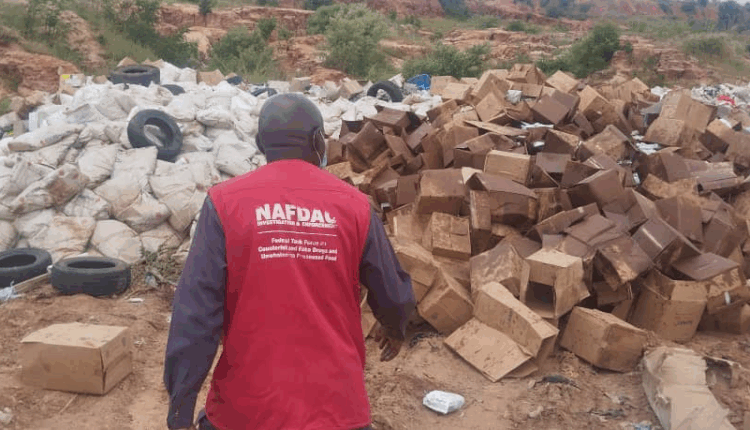The staggering revelation that the National Agency for Food Drug Administration and Control (NAFDAC) destroyed over N120 billion worth of fake products in just six months paints a disturbing picture of the magnitude of counterfeit trade in Nigeria.
This figure, representing seizures between October and December 2024 alone, should send shivers down the spine of every Nigerian consumer and policymaker. That such massive quantities of dangerous products could find their way into our markets speaks volumes about the ineffectiveness of our regulatory framework and border controls.
The scope of these seizures – from fake medicines to counterfeit alcoholic beverages, from repackaged expired rice to adulterated food products – reveals a sophisticated criminal enterprise that puts profit above human life.
When NAFDAC raids supermarkets in major cities like Lagos, Port Harcourt, Aba, and Abuja, only to uncover billions worth of fake products, it becomes clear that this is not merely a peripheral problem but a full-blown crisis that threatens public health and the economy.
The discovery of illegal revalidation of expired alcoholic beverages at the Trade Fair Complex in Lagos and the sealing of factories packaging counterfeit rice worth N5 billion in Nasarawa State underscore the audacity of these criminal operations.
Most alarming is the timing of these discoveries, coinciding with the festive season when consumer spending typically peaks. These merchants of death, as NAFDAC’s director general, Prof Mojisola Adeyeye aptly calls them, deliberately target periods of high consumption to maximize their illegal profits. The shutdown of 150 shops in Aba’s Eziukwu Market, where large-scale production and distribution of fake goods ranging from beverages to vegetable oils was uncovered, demonstrates how deeply entrenched this criminal enterprise has become in our commercial centers.
The implications extend far beyond immediate health risks. Counterfeit products undermine legitimate businesses, rob the government of tax revenue, and damage Nigeria’s reputation in international trade.
When fake products flood our markets, genuine manufacturers struggle to compete, leading to job losses and economic instability.
Moreover, the prevalence of counterfeits erodes consumer confidence in Nigerian products, both domestically and internationally.
The economic impact is particularly severe in sectors like pharmaceuticals, where the presence of counterfeit drugs not only endangers lives but also discourages investment in research and development.
In our view while NAFDAC’s aggressive enforcement actions are commendable, they also highlight the reactive nature of our approach to this problem. Destroying N120 billion worth of fake products, while necessary, represents a failure of prevention. It raises questions about the effectiveness of our border controls, market surveillance systems, and the entire regulatory infrastructure meant to prevent such products from entering the market in the first place.
The fact that counterfeiters can operate elaborate packaging centers and distribution networks suggests significant gaps in our monitoring and enforcement mechanisms.
The solution to this crisis requires a multi-faceted approach. First, there must be stronger collaboration between NAFDAC, customs officials, and other security agencies to prevent the entry of counterfeit products into the country. This should include joint task forces, shared intelligence, and coordinated operations at ports of entry.
Second, the punishment for manufacturing and distributing fake products must be severe enough to serve as a deterrent. Currently, it appears the potential profits outweigh the risks for these criminal enterprises.
Technology must also play a crucial role. Modern track-and-trace systems, product authentication technologies, and consumer verification tools should be mandatory for high-risk products. The public needs easier ways to verify the authenticity of products before purchase, beyond just looking for NAFDAC numbers that can be easily forged. Blockchain technology and digital verification systems could provide robust solutions for product authentication and supply chain transparency.
Furthermore, consumer education must be intensified. While NAFDAC’s advice about checking for quality packaging and avoiding suspiciously low-priced products is useful, a more comprehensive public awareness campaign is needed. Consumers must understand that buying counterfeit products is not just about getting a bargain – it could be a matter of life and death. Educational programs should reach into schools, communities, and marketplaces, teaching people how to identify suspicious products and report them to authorities.
The private sector, particularly legitimate manufacturers and retailers, must also step up. They should invest in anti-counterfeiting technologies and work more closely with regulatory authorities to protect their brands and consumers.
The formation of industry-wide coalitions to combat counterfeiting could provide additional resources and expertise to this fight. Companies should also consider establishing customer feedback mechanisms that help identify and track counterfeit products in the market.
As we reflect on these massive seizures, it becomes clear that Nigeria cannot afford to continue treating the symptoms while ignoring the disease.
Until we address the root causes of this problem – weak enforcement, porous borders, inadequate technology, and insufficient penalties – we will continue to count the cost in both financial terms and human lives.The war against counterfeit products must be won, and it must be won now.

